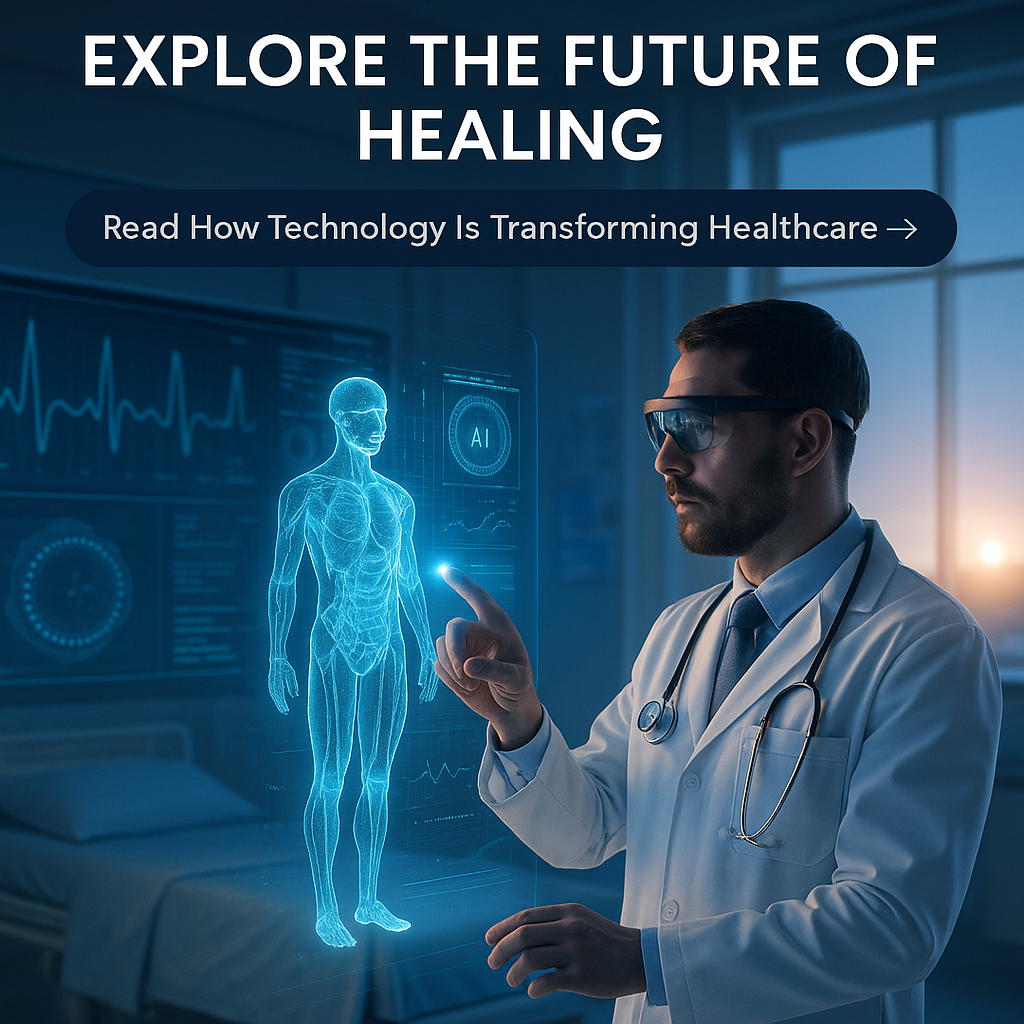 |
| “Explore the Future of Healing” |
Technology has revolutionized many industries, but its impact on healthcare has been particularly transformative. From improved patient outcomes to more efficient medical processes, technology is playing a pivotal role in shaping the future of healthcare. This article explores the current trends in healthcare technology and offers a glimpse into what the future may hold.
Current Trends in Healthcare Technology
Telemedicine and Remote Care The rise of telemedicine has been one of the most significant developments in healthcare over the past decade. Telemedicine allows patients to consult with healthcare professionals remotely, reducing the need for in-person visits. This trend has been accelerated by the COVID-19 pandemic, as more people sought medical care from the safety of their homes. Telemedicine not only provides convenience but also expands access to healthcare for those in remote or underserved areas.
Artificial Intelligence and Machine Learning Artificial Intelligence (AI) and Machine Learning (ML) are increasingly being integrated into healthcare systems. AI-powered tools can analyze vast amounts of data to assist in diagnostics, predict patient outcomes, and even suggest personalized treatment plans. For example, AI algorithms can detect patterns in medical images that may be too subtle for the human eye, leading to earlier diagnosis and treatment of diseases like cancer.
Electronic Health Records (EHRs) The adoption of Electronic Health Records (EHRs) has streamlined patient care by providing healthcare providers with easy access to comprehensive patient histories. EHRs improve communication between different healthcare providers and reduce the risk of errors associated with paper records. Additionally, EHRs enable more efficient and accurate billing, which benefits both patients and healthcare providers.
Wearable Devices and Health Monitoring Wearable devices, such as fitness trackers and smartwatches, have become increasingly popular for monitoring health metrics like heart rate, sleep patterns, and physical activity. These devices empower individuals to take a more active role in managing their health. In clinical settings, wearable technology can provide continuous monitoring of patients with chronic conditions, allowing for early intervention when necessary.
Blockchain for Data Security Blockchain technology is emerging as a solution to enhance data security in healthcare. With the increasing digitization of health records, there is a growing need to protect sensitive patient information. Blockchain provides a secure, decentralized way to store and share medical data, ensuring that it is only accessible to authorized parties.
Future Prospects of Technology in Healthcare
Personalized Medicine The future of healthcare lies in personalized medicine, where treatments are tailored to individual patients based on their genetic makeup, lifestyle, and environment. Advances in genomics and AI will make it possible to create highly customized treatment plans that are more effective and have fewer side effects. Personalized medicine has the potential to revolutionize the way we approach diseases like cancer, diabetes, and cardiovascular conditions.
Robotic Surgery Robotic surgery is expected to become more widespread in the coming years. Robots equipped with AI and precision tools can perform minimally invasive surgeries with greater accuracy than human surgeons. This technology reduces recovery times, minimizes surgical risks, and can even perform complex procedures that were previously considered too difficult.
Virtual Reality (VR) and Augmented Reality (AR) VR and AR are set to play a significant role in medical training and patient treatment. VR can simulate real-life surgical procedures for training purposes, allowing medical students and professionals to practice without the risks associated with live surgery. AR, on the other hand, can be used during surgeries to provide surgeons with real-time data and 3D visualizations of the patient's anatomy, enhancing precision.
Nanotechnology in Medicine Nanotechnology holds immense potential for the future of healthcare. Nanoparticles can be engineered to deliver drugs directly to cancer cells, minimizing damage to healthy tissues. Additionally, nanotechnology could lead to the development of advanced diagnostic tools that detect diseases at the molecular level, long before symptoms appear.
5G and the Internet of Medical Things (IoMT) The rollout of 5G networks will enhance the connectivity and capabilities of the Internet of Medical Things (IoMT), a network of connected devices that monitor and collect health data. 5G will enable faster data transmission, allowing for real-time monitoring and more responsive healthcare services. IoMT devices will become more integrated into everyday life, providing continuous health monitoring and predictive analytics.
Conclusion
The impact of technology on healthcare is profound and far-reaching. Current trends like telemedicine, AI, and wearable devices are already transforming the industry, while future developments in personalized medicine, robotic surgery, and nanotechnology promise to take healthcare to new heights. As technology continues to evolve, it will undoubtedly play an increasingly central role in improving patient outcomes, enhancing the efficiency of healthcare delivery, and making healthcare more accessible to all.
By staying informed about these trends, healthcare professionals, patients, and policymakers can work together to harness the power of technology to create a healthier future.